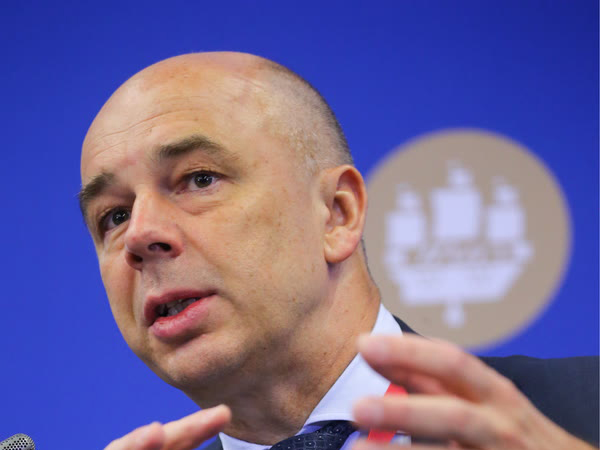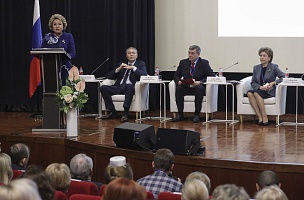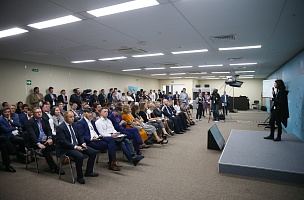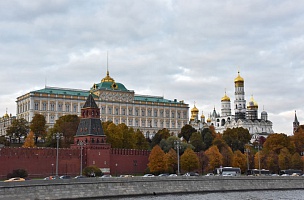KEY OBSERVATIONS
The country’s budget determines macroeconomic stability and economic growth rates
“How the economy works depends in large part on how the budget is organized. The situation with the budget and the situation with oil and gas have determined the growth rate of the economy. Oil prices declined, and the economy went down. Oil prices grew, and what followed was the 5–6% growth we all saw in the previous years. But this is not because we have implemented some kind of reforms. And the last time we had growth rates over 4% was in 2011, because oil prices rose to USD 110 a barrel back then. We spent more money through the budget, more money came into the economy. Now a tool has been created by which the influence of oil prices and other external factors is offset by the principles upon which the budget has been based.” – Anton Siluanov, First Deputy Prime Minister of the Russian Federation – Finance Minister of the Russian Federation
After a number of clarifications, tax system to remain unchanged for 6 years
“After adopting clarifying parameters in the tax system, we have no intention of changing them for at least 6 years. Yes, there will be changes now. We plan to make the primary tax decisions in the spring session of the State Duma. This is just predictability for business.” – Anton Siluanov.
Planning based on budget rules will ensure predictability of exchange rate policy
“We will plan the budget in accordance with the principles and rules that we have set out in legislation. This is a key question of the predictability of exchange rate policy. In many ways, we depend on the situation in world markets. Therefore, the price of oil, gas – it all affects our rate. The predictability of exchange rate ratios is one of the elements of predictability of business performance and one of the elements of the desire or unwillingness to invest in our economy. These budget rules just level the exchange rates and grant predictability to changes in exchange rates. This is a key task of the Ministry of Finance.” – Anton Siluanov.
Income tax to remain unchanged
“We propose not changing the situation with income tax. It is the main source of local budgets and one of the key sources for regional budgets. Therefore, any changes could conceivably lead to serious shifts in budgets.” – Anton Siluanov.
Tax system must correspond to global trends
“On the one hand, demography and the aging population lead to a revision of the retirement age and a reduction in the burden on the budget as a result. On the other hand, robotics and automation wash out the tax base as some jobs are lost. We, in turn, motivate economic growth through a reduction in the tax burden in general, but we do this by redistributing these funds into human capital.” – Igor Lotakov, Country Managing Partner, PwC Russia.
PROBLEMS
Personal social support system not yet created
“From year to year, the task is to create a personal system of social support, to have it identify the needy. This has not been done.” – Stanislav Voskresensky, Acting Governor, Ivanovo Region.
Revenue shortfall expected due to reduction in excise taxes on fuel
“There will be a decrease in excise rates for gasoline. We understand perfectly well how explosive the growth in fuel has been. This is 140 billion roubles in revenue shortfall, huge losses for regional road funds.” – Andrey Makarov, Chairman of the Committee on Budget and Taxes.
Change in the social insurance system required for non-workers
“I am committed to changing the insurance system for non-working people because it imposes quite large liabilities on the budgets of the regions. To date, it has had a very serious impact on the entire building of intergovernmental fiscal relations.” – Tatyana Golikova, Deputy Prime Minister of the Russian Federation.
Tax Code loses status as direct action normative act
“In 1998, when the Tax Code was adopted, it was called an act of direct action that would create clearer tax rules. Much has changed in 20 years. The code has now lost this defining quality. There are a lot of reference rules to the acts of executive authorities. In the first part of the Tax Code alone there are more than a hundred references. Different articles of the Tax Code are set up as if they were the only ones of their kind, and they have no connection to the previous sections or to those that follow. We lack a codified act at present.” – Mikhail Orlov, Partner, Head of Tax and Legal, KPMG Russia.
SOLUTIONS
To attract investments, it is necessary to ensure predictability of macroeconomic policy
“The primary goal is to ensure growth of 3–4%. To do this we need more investments, especially extra-budgetary investments, which we expect to come from entrepreneurs and foreign investors, etc. Therefore, we need to create conditions that are conducive to profit. So that investments made in Russia bring in a stable income, are predictable, and cover investor risks. Therefore, the issue of stability, predictability of conditions – these are issues of fiscal, budgetary, and monetary policy.” – Anton Siluanov.
Budget manoeuvring must meet development goals
“We are talking about the need for budgetary manoeuvring within expenditures, restructuring them in such a way as to better meet development goals. Now our task is to provide just such a manoeuvre within expenses so that the expenses would stimulate investment. We’re talking about infrastructure, the development of the digital economy, and support for exports. It is our intention to see to all of this, including by means of budgetary measures.” – Anton Siluanov.
Budget and tax codes need modernizing
“We need to modernize the Tax and Budget codes. The Tax Code as it is contains such a number of amendments that it has become contradictory and lost what was most important in it as a law of direct action. We need a new version. Budget legislation, it seems to me, is written for the employees of the Ministry of Finance. I would like the Budget Code to be a clearer, more transparent document.” – Vladimir Mau, Rector at the Russian Presidential Academy of National Economy and Public Administration (RANEPA).
Transfer of excise from the federal level to the regions
“A decision has been made to reduce excises. The state will receive less taxes here. Excises on gasoline and diesel are one of the main sources for road funds for the regions of the Russian Federation. To ensure the stability of the road industry, the stability of the implementation of those regional plans that have already been created for the current year, we will have to give almost 100% of excises to regional road funds.” – Anton Siluanov.
May presidential decree calls for dialogue between the federal centre and the regions
“We will have to hold a dialogue not only at the federal level, but with all 85 regions about what real measures and what real indicators are behind the implementation of the priorities that we have given the simple names of education, healthcare, demography, etc. This is important because the position should be consolidated. If there is a fragmented approach to the sectors, nothing good will come of it. We did not have a very good experience in the previous 6 years, when this internal disconnection led to the regional budgets’ being severely unbalanced on account of their additional obligations.” – Tatyana Golikova.
Optimizing the regional budgetary system
“From the point of view of social expenditures, the May presidential decree envisages a level of financial burden that regions can bear. We have developed a system that involves the phased elimination of indirect tax benefits, first of all, on income tax, and have replaced of this tool with other tools: special investment contracts, investment projects, etc. The volume of funds that we will additionally receive in the regional budget ought to be enough to maintain the level achieved under the previous decree.” – Maksim Reshetnikov, Governor of Perm Territory.






